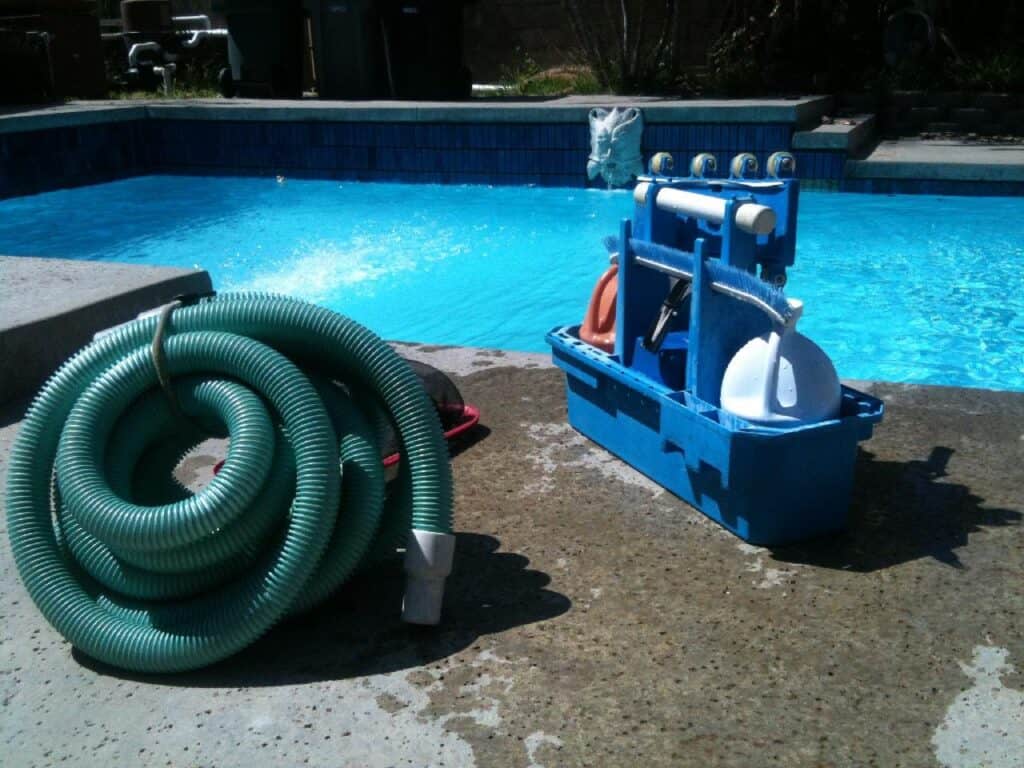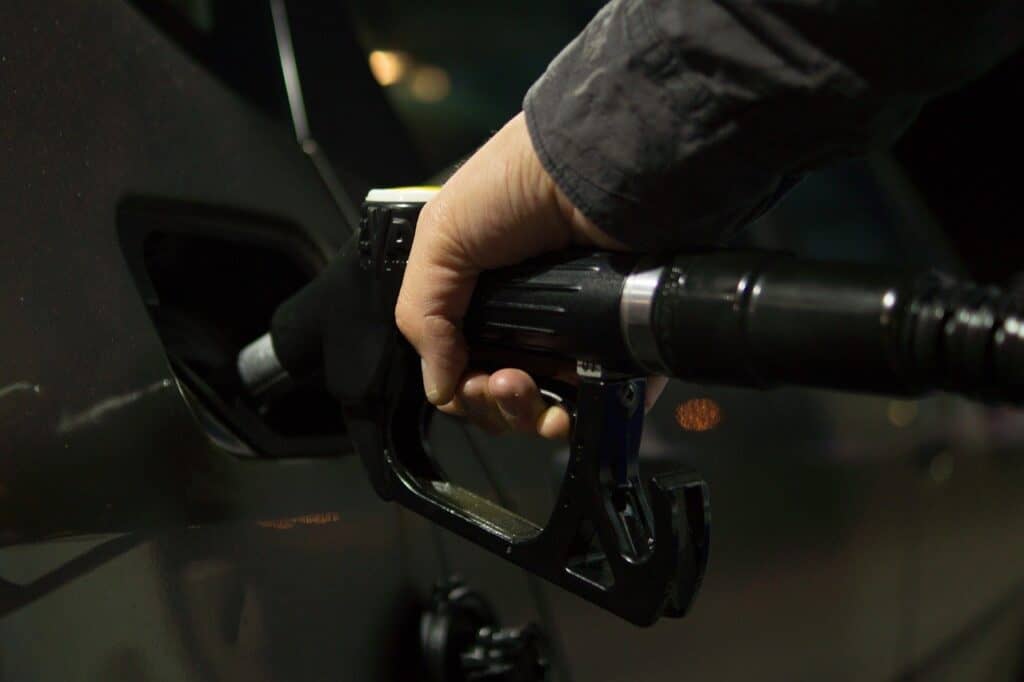Chlorine has been important to chemists and before chemists, alchemists, for a very long time. However, it wasn’t separated as an individual substance, Chlorine gas, until 1774. Even then, the chemist who isolated it, thought it was a different substance. Fortunately, we don’t have to examine the hard questions here and our focus is on the flammability of chlorine and whether it’s a fire risk?
Chlorine is not flammable and cannot burn. It is an oxidizer and it won’t react with oxygen. However, as an oxidizer, it can cause fires to burn faster, hotter, and more intensely. It can even cause explosions in certain situations.
So, even if chlorine can’t technically burn, it is not safe around fire. And that is what most people want to know when they ask if something is flammable. Let’s take a closer look.
Your # 1 priority is keeping your family safe. As a firefighter, I recommend everyone has updated smoke detectors that don’t require battery changes, like these ones from Kidde, a fire extinguisher, like this one from Amerex, and a fire escape ladder if you have bedrooms above the first floor, I recommend this one from Hausse.
Also read: What Makes Something Flammable?
About Chlorine

Chlorine, the chemical symbol Cl, is a halogen and one of the more common elements on earth.
It is an extremely reactive substance and is never found naturally as chlorine gas, but it is present throughout the Earth’s crust in many different compounds.
To produce chlorine gas requires the electrolysis of saltwater (brine) and this separates the Sodium and Chlorine ions in solution.
Chlorine is widely used in the chemical industry and in the production of organic chemicals such as PVC (polyvinyl chloride).
It’s also used in bleaches and disinfectants and nearly everyone has been in a swimming pool that has been cleaned using chlorine at some point or another.
Nearly every known life form needs chloride ions, in some form, to survive.
Human beings use chloride ions to transmit signals through muscles and nerves and a lack of chloride ions (or an excess of them) can lead to cramping and even seizures.
Also read: Is PVC Pipe Flammable? Is it Fire Resistant?
Is Chlorine Flammable?
Chlorine is one of the most reactive elements and you would probably expect it to be highly flammable, but its chemistry is similar to that of oxygen, and it is an electron donor in chemical reactions, not an electron receiver.
This means that it cannot react with oxygen and thus, it’s not at all flammable. Fire is the process of rapid oxidization and it requires fuel as well as an oxidizer. So, chlorine can act as the oxidizer, but it does not burn.
Chlorine can be a part of the fire process, but it is not flammable itself.
Also read: Is Bleach Flammable or Explosive?
Can It Ever Catch On Fire?
Technically speaking, because Chlorine is not flammable (by any measure) it cannot burn, but that doesn’t mean that the use of chlorine cannot create fires.
Many reactions involving chlorine form unstable products that can easily catch fire or even explode. Like we talked about above, chlorine can act as the oxidizing agent (in place of or in addition to oxygen) in a fire, but not the fuel. It does not burn.
You can see what happens when it is mixed with brake fluid in this video:
Also read: Is Ammonia Flammable?
What Happens When you Mix Chlorine?
In fact, the reactivity of chlorine, not just as chlorine gas, but also in other compounds can have seriously catastrophic consequences.
Evo Heat recounts two recent accidents in Australia.
The first, involved a gentleman named Clinton Maynard, accidentally mixing a chlorine treatment for his pool with the wrong chemicals, he would later claim that the instructions had failed to warn him of the consequences, and he blew himself up.
Luckily for Clinton, his neighbors were on hand to hose him down and call an ambulance, otherwise, his mistake might have been fatal.
The second incident was even scarier.
Hotel staff in the Park Hyatt in Sydney accidentally mixed together hydrochloric acid and a chlorine compound releasing toxic fumes.
This would see six people sent to the hospital and 100 more evacuated from their rooms while fire crews tried to deal with the issue and ventilate the area properly.
Also read: Is Iodine Flammable?
Can Pools Explode?
Swimming pools can explode, but fortunately, most of the time, this is not due to the presence of chlorine as a cleaning agent.
(Though, in theory, you could add chemicals to a swimming pool that would react explosively with chlorine, people appear to have more sense than to do this).
In fact, the majority of swimming pool explosions appear to be linked to the swimming pool filter equipment, when this wears down, it is possible for gas to be pulled into the filter but not expelled from it.
This increases the pressure inside the filter and if left for long enough, it will explode.
This is no joke.
Records show that several people have died due to exploding pool filters and many more have been injured too.
Can You Mix Shock And Chlorine?
Shock is a commonly used anti-algal (anti-algae) treatment for swimming pools and it’s easy to buy and use.
However, it’s important to realize that you should not add this anti-algal treatment to the pool at the same time as you use chlorine, this is because they will neutralize each other, and the algae won’t die.
You should also be aware that if you’re using chlorine crystals for the treatment, you should always add them to water, rather than try and add water to the crystals.
This might sound like a trifling detail but if you remember Mr. Maynard and his unfortunate trip to the hospital?
That was due to the chlorine crystals exploding in a bucket before he’d had a chance to add water to them.
What Happens If You Mix Chlorine And Diesel?
We don’t imagine that many of you were thinking of mixing chlorine and diesel, but chlorine is present in the bleach sodium hypochlorite, which is often used to clean up in garages and workshops.
Unfortunately, when you use sodium hypochlorite to clean up a diesel spill, you’re taking your own life into your hands.
The sodium hypochlorite reacts violently with the diesel.
It produces large quantities of heat, potentially explosively, and generates pure chlorine gas and as we shall soon see, that’s not a good idea at all.
What Happens If You Mix Chlorine And Alcohol?
Again, we’re not expecting you to rush out and buy a cylinder of chlorine to pump through your vodka, but if you were to clean up a rubbing alcohol spill using sodium hypochlorite bleach, things could go badly wrong.
The two chemicals react and this time, instead of exploding and releasing chlorine gas, they combined to make chloroform.
Chloroform was once used as an anesthetic until they realized that it can cause serious damage to people’s brains, hearts, kidneys, livers, and even their bone marrow!
It can also cause unconsciousness which will lead to further damaging exposure.
So, the moral of the story here is that you need to be careful when using bleach to mop up spills and make sure it doesn’t react with the thing you’re cleaning up.
Also read: Is Acetone Flammable?
Does Chlorine React With Water?
Chlorine gas does react with water, but it doesn’t cause a fire, instead, it forms hypochlorite ions which act as a powerful disinfectant.
But that doesn’t mean the reaction can’t cause a fire, it also releases hydrogen from the water and if this is done indoors, then the hydrogen could build up and hydrogen is both flammable and explosive.
Outdoors, this isn’t an issue as hydrogen is much lighter than air and will simply float away long before it has any chance to get to an explosive concentration.
Does Ammonia Neutralize Chlorine?
If you intend to use chlorine to disinfect something, you should also ensure that it’s not something that is full of ammonia.
That’s because the two neutralize each other and the chlorine is used up before it has any chance to kill off any bacteria.
Is Chlorine Toxic
Chlorine compounds may or may not be toxic.
Certainly, you wouldn’t want to drink sodium hypochlorite bleach, but you’d be happy to use table salt (sodium chloride) on your dinner.
Chlorine gas, on the other hand, is so toxic that it has been used as a weapon of war and is often referred to as “mustard gas” due to its yellowy-green color and cloying aroma.
How Much Chlorine Gas Can Kill You?
It doesn’t take very much chlorine to kill someone and at 30 parts per million in the air, if it is breathed in, it will cause chest pains, coughing, and shortness of breath.
And by 60 parts per million, it can create edema or pneumonitis in the lungs, which can lead to death fairly rapidly.
How Do You Clean Up A Chlorine Spill?
If you spill chlorine, then you should:
- Remove any clothing that has been exposed to it, place it in a plastic bag and seal it.
- Then wash it off your skin with large quantities of water and as much soap as you can.
- If it got in your eyes, flush them too and do so for a long time, with a lot of water.
- Then open all the windows and doors.
- Use rags to stop the flow of any liquid.
- Take the rags outside when they are soaked (don’t touch them) and let them air dry and away from contact with kids or pets.
- Then wrap up the rags and seal them in a plastic bag and dump them in the trash.
- Finally, decontaminate the area by cleaning..
- This will prevent the chlorine from reacting with anything else and causing a fire.
Is Swimming In Chlorine Bad For You?
There is a lot of debate on this subject and many fitness gurus and the cosmetic industry claim that chlorine in pools can damage your skin, eyes, teeth, nails, eyes, etc., and even your lungs.
It is certainly true that too much chlorine can temporarily irritate the eyes (and most swimmers will have experienced this) but overall, there is little compelling evidence that the very low levels of chlorine in a pool have any long-term effects on your health.
Sources
1, 2, 3, 4, 5, 6, 7, 8, 9, 10, 11, 12, 13

